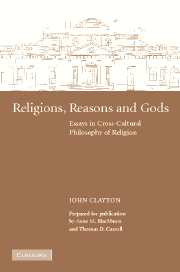Book contents
- Frontmatter
- Contents
- Editorial preface
- Acknowledgments
- List of abbreviations
- 1 Claims, contexts and contestability
- PART I REASON AND RELIGIOUS PLURALISM
- PART II THEISTIC ARGUMENTS IN PRE-MODERN CONTEXTS
- 5 Ramanuja, Hume and ‘comparative philosophy’: remarks on the Sribhasya and the Dialogues concerning Natural Religion
- 6 Piety and the proofs
- 7 The otherness of Anselm
- PART III THEISTIC ARGUMENTS IN EARLY-MODERN CONTEXTS
- Appendix: The 1997 Hulsean Sermon
- Bibliography
- Index
5 - Ramanuja, Hume and ‘comparative philosophy’: remarks on the Sribhasya and the Dialogues concerning Natural Religion
Published online by Cambridge University Press: 22 September 2009
- Frontmatter
- Contents
- Editorial preface
- Acknowledgments
- List of abbreviations
- 1 Claims, contexts and contestability
- PART I REASON AND RELIGIOUS PLURALISM
- PART II THEISTIC ARGUMENTS IN PRE-MODERN CONTEXTS
- 5 Ramanuja, Hume and ‘comparative philosophy’: remarks on the Sribhasya and the Dialogues concerning Natural Religion
- 6 Piety and the proofs
- 7 The otherness of Anselm
- PART III THEISTIC ARGUMENTS IN EARLY-MODERN CONTEXTS
- Appendix: The 1997 Hulsean Sermon
- Bibliography
- Index
Summary
In an article on the current state of Indology, first published in Hochland in the late 1960s, Paul Hacker made a plea for a new kind of philosophizing, one grounded in an immediate knowledge of both Indian and European sources. This quotation was later used as the epithet for the muchrespected book India and Europe by Wilhelm Halbfass, whose work as a whole can be said to have exemplified just that kind of philosophizing.
However dubious one may be that it is ever possible to have immediate knowledge of any text, one cannot but agree that doing philosophy would be greatly enriched by immersion in the main texts of a variety of reflective traditions, including – of course – the reflective traditions of India. Ideally, one would want to be open to more than just the traditions of India and ‘the West’, intricately differentiated though each of them may be in itself. The ideal would be, from intimate knowledge of several traditions, to develop a reflective style that is global and not simply bi-cultural. The ideal, however, is just that – an ideal. It is for most of us hardly possible to master the varieties even of Western and Indian thought in tandem, to discern the points of real (not just apparent) difference and similarity, much less to add to that the full range of other indigenous styles of reflection it would be necessary to master in order to earn a right to philosophize in a global mode or a right to undertake what is now grandly called ‘world philosophy’.
- Type
- Chapter
- Information
- Religions, Reasons and GodsEssays in Cross-cultural Philosophy of Religion, pp. 101 - 132Publisher: Cambridge University PressPrint publication year: 2006

